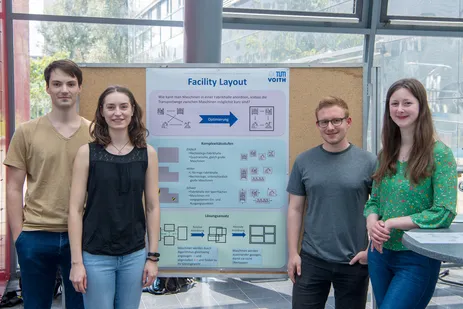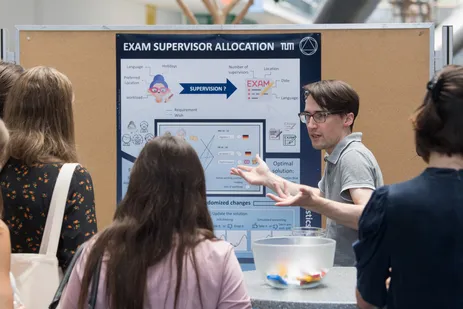The teaching event "Case Studies in Discrete Optimization" has been taking place since 2009 and has established itself, together with its partner event "Case Studies in Non-Linear Optimization", as a success story. Within the seminar, which takes place every summer term, students can realistically experience how complex mathematical procedures can be used to solve real everyday problems, working together with researchers and businesses and presenting their ideas and results to a general audience.
Case Studies: The Idea
"Challenging mathematics with an applied profile" – this is how the Department of Mathematics at the Technical University of Munich characterizes its study courses. The truth of this claim is visible in the numerous projects which are offered in cooperation with partners from industry and business, as well as together with related TUM departments in the areas of engineering, economics and life sciences.
In order for our students to practically apply their math knowledge during their studies, we have created the seminars "Case Studies in Discrete Optimization" and "Case Studies in Non-Linear Optimization". Here the students can implement knowledge acquired in their lectures and seminars in real projects demanding a high level of personal responsibility, whilst also offering a large amount of freedom in the scope of the project tackled.
The first hurdle is to understand the practical challenge of the project and then to model and analyse the task in small teams. Subsequently, the students develop and implement suitable solutions for the problem. In order to offer realistic problems to be solved, the department works together with external partners.
The Origins
The first event "Discrete Optimization: Case studies using real life examples" took place in the summer semester 2009 and was such a success that the event was awarded the Felix Klein Teaching Prize of the Department of Mathematics. Since then, the regular events "Case Studies in Discrete Optimization" and "Case Studies in Non-Linear Optimization" have become central elements within the degree program Master Mathematics in Operations Research.
The students start their project work in small teams of 3 to 5 persons. They get to know their project partners, plan together their aims for the project and their concrete path of action, work out a time plan and delegate the responsibilities within the team. Regular meetings with the supervisors guarantee that the expectations of both sides of the partnership regarding the aims of the project are clear and compatible, and that the targets are realistic.
The supervisors professionally support the work of the students. The groups regularly report back on their progress and plan the next steps together. They discuss theoretical questions and are given technical support from the project partners. In soft skills sessions they practice presentation skills, as well as how to structure and prepare overheads and slide presentations.
In a midterm presentation, each team reports on the current status of their project and receives extensive feedback from the other participants and supervisors. The highlight and closing event of the case studies seminar is the one-day scientific workshop SCoNDO which the supervisors of the case study modules prepare and present together.
SCoNDO – the Closing Workshop
The Students' Conference on Nonlinear and Discrete Optimization (SCoNDO) takes place once a year in summer. Here, the participants of the two courses "Case Studies in Discrete Optimization" and "Case Studies in Non-Linear Optimization" present their projects and present their results in a short public scientific talk.
In addition, they can discuss the specific challenges, the mathematical theory and the practical results in short question-and-answer sessions and during the coffee and lunch breaks. A joint "Conference Dinner" will conclude the event.
The conference is open to visitors. Everyone interested in mathematical optimization and its applications in real-world projects is cordially invited. So come and see for yourself and talk to our students. The next ScoNDO will take place 14./15. July 2025.
SCoNDO 2025
Our final workshop will take place 14/15 July 2025 at TUM campus Garching-Hochbrück, Hörsaal BC2 0.01.17 (Parkring 35-39, 85748 Garching b. München). Talks will start at 16:00 on both days; TUM students, staff, and everyone interested in exciting mathematical real-world applications are welcome to attend. We would appreciate registration by email to michael.ritter(at)tum.de so we can make sure there will be an ample supply of coffee and cookies.
Schedule
Monday, 14 July
16:00 – District Heating Networks
Team “District Heating Networks”
District Heating Networks offer a centralized, sustainable solution for delivering heat to residential areas. The focus of the case study was to develop and test models that can solve a profit maximization network problem and prove under which conditions an optimal solution can be found.
Two optimization models were designed: a Mixed-Integer Linear Program (MILP) and an iterative approach based on Prize-Collecting Steiner Trees (PCST). Using district data from Hamburg and with the help of Siemens, each model was applied to simulate realistic scenarios and assess their effectiveness under varying network conditions.
17:15 – Coffee Break
17:45 – 2D to 3D: Reconstructing Reality
Team “3D Reconstruction”
Photometrically challenging surfaces, such as non-Lambertian materials, transparent objects, or scenes with repeating patterns, can significantly hinder the performance of traditional bundle adjustment (BA) methods. Our project aims to improve the robustness of COLMAP’s BA by replacing its default loss function with more robust alternatives and by incorporating lifting schemes. To improve the loss function, we employ the Barron loss with parameters analytically derived from local BA residuals and depth distributions, and apply it during the global BA phase. Lifting introduces point-wise weights as additional optimization variables, allowing the algorithm to downweight outliers and better reconstruct relevant scene points.
Since real image datasets often lack reliable ground truth, we evaluate our methods on synthetic data where ground truth is fully available. This includes both procedurally generated point clouds with synthetic cameras and Blender-based photorealistic renderings of 3D scenes. These controlled setups allow us to rigorously assess reconstruction quality using metrics such as reconstruction density and distance to the ground truth geometry.
Tuesday, 15 July
16:00 – Learning to Plan: Trajectory Optimization with Neural Signed Distance Fields
Team “Trajectory Optimization”
Autonomous robots must navigate dynamic, cluttered environments while respecting complex dynamics and collision constraints. Classical trajectory optimization methods often become computationally expensive in such settings, as they require a large number of geometric constraints for obstacle avoidance.
In this project, we investigate an alternative approach: approximating the environment using neural signed distance fields (SDFs), which provide smooth, differentiable representations of obstacles. These learned SDFs are integrated into an optimal control pipeline using multiple shooting and nonlinear programming techniques. We evaluate this method across a series of benchmarks and compare it to classical formulations, analyzing trade-offs in performance, robustness, and scalability. Our findings demonstrate that learning-based models can significantly reduce problem complexity while maintaining trajectory quality.
17:15 – Coffee Break
17:45 – Inventory Routing
Team “Inventory Routing”
Industrial facilities rely on a steady supply of oil, gas, etc. stored in on-site tanks. To ensure smooth operations, these tanks are typically monitored by sensors, tracking consumption and helping to predict when refills are needed. While deliveries must occur before safety stock levels are violated, demand patterns are often predictable, allowing for flexibility in scheduling deliveries.
In this presentation we explore how to plan efficient delivery routes for multiple days, including selecting which facilities to service, incorporating the up-to-date data from the tank level monitoring sensors and available predictions ensuring the customers’ tanks never run empty.
We will first present a Mixed-Integer Programming model that accurately describes our problem. Based on this we will describe different algorithmic approaches, including a Mixed-Integer-Programming-Guided local search framework for vehicle routing as well as a heuristic algorithm consisting of three different parts: First, a customer selection, determining must-go and may-go customers and assigning delivery dates. Secondly, a sweep algorithm, constructing easy, but feasible, routes for the input of the last part. Finally, an adaptive large neighbourhood search, improving our first feasible solution. In the end we will present our computational results and compare our different approaches.
19:00 – Evaluation and Feedback
20:00 – Conference Dinner
Our Cooperation Partners
Our past partners include Audi, BMW, car2go, Deutsche Bahn, DLR, Flixbus, Framos, HAWE Hydraulik, iABG, IAV, Logivations, risklab GmbH, Siemens, the World Food Programme and various research institutes from other departments at TUM.
Do you have an optimization project which is suitable for a student project with a duration of one semester? We would be happy to explain more about our cooperation possibilities. Please contact Dr. Florian Lindemann.
Practice and Career for Mathematics Students
The Department of Mathematics offers you further opportunities to gain practical experience during your studies.
The TUM Data Innovation Lab (TUM-DI-LAB) is aimed at Master's students who want to research data-driven methods for interdisciplinary practical tasks. Every semester, the Lab offers new projects.
In order for our students to learn how to work in an application-oriented way during their bachelor studies, we offer them Case Studies of Mathematical Modelling.

